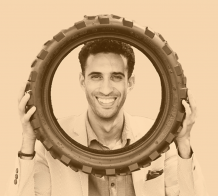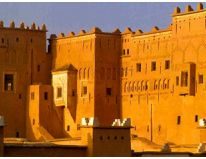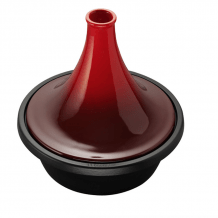
UN statistics suggest that average literacy rates in Morocco are as high as 67% (in 2011). However, this figure hides large discrepancies between males and females and between urban and rural populations. Typically, girls in Morocco are less well-educated than boys. Additionally, in rural communities or poorer areas of the medinas, parents may remove children from school at an early age to work or help the family. The Medina Children’s Library in the medieval old city of Fez aims to support children’s learning and make it fun.
Co-founder of the library, author Suzanna Clarke, says: “Houses I have visited in the Medina rarely have books beyond the Koran, and certainly none for children. Lots of children don’t continue their education past primary school and are expected to become part of the family business.”

Since its opening in January 2015, the Fez Medina Children’s Library has become a big hit with local kids. On average, between 35-50 kids attend every day. In May 2015 alone, it welcomed over 1,100 children through its doors. Wafae, aged nine, explains: “Before the library was here, I only used to play in the street with my friends.” And Kawtar, five years old, added, “I come to the library because I want to read more stories. They stay with me always.” Local children are really excited to have a place to go to discover books, listen to stories and read in a welcoming and safe environment near their homes. They can also borrow books for up to a week to read at home and share with their families. Khadija, aged 13, explains: “I come to read short stories and novels in French and Arabic. I also like to take the books home to read them.”
The library has been conceived with a particular focus on younger children: pre-readers and developing readers (up to the age of 14 years old). Children in the Fez medina have ample access to TV and the internet, but children need age appropriate and culturally relevant books to fuel their learning and development as they grow. Through their own enthusiasm for reading, they can also ignite an interest in their parents, many of whom themselves are illiterate.

As well as reading, the children can come to the library to listen to stories read from books. Once a day in the week and twice daily at weekends, a volunteer reader brings the stories alive and continues a tradition of oral storytelling very familiar to the children. They sit quietly to listen and are eager to answer comprehension questions. The sessions encourage them to discover the stories contained in the books for themselves.
The librarians are locals and receive a salary for their work. Hamza, 23, is studying for a degree in English. He got involved because “I live in the medina, I like reading and I like children.” He and fellow librarian Safae supervise the kids in the library and faithfully record their attendance and the books they borrow.
The Medina Children’s Library is managed by the Fez Association for Children of the Medina. The association’s members are volunteers committed to improving the lives of children in the Fez Medina and to bringing their own love of reading to the children of their local neighbourhood. They have great ambition to expand the library to new premises and add extras such as creative, sport and environmental activities to the library’s remit.
The library is open 10am – 7pm on weekdays and 10am – 6pm at weekends at 41 Zkak Rouah – Talaa Sghira in the Fez Medina. Further information on the library and how to contribute are available at: www.medinachildrenslibrary.org
Article References:
www.data.worldbank.org/indicator/SE.ADT.LITR.ZS
www.unicef.org/infobycountry/morocco_statistics.html
For more information about the Fez Medina’s Children’s Library or a Tour of Fes





